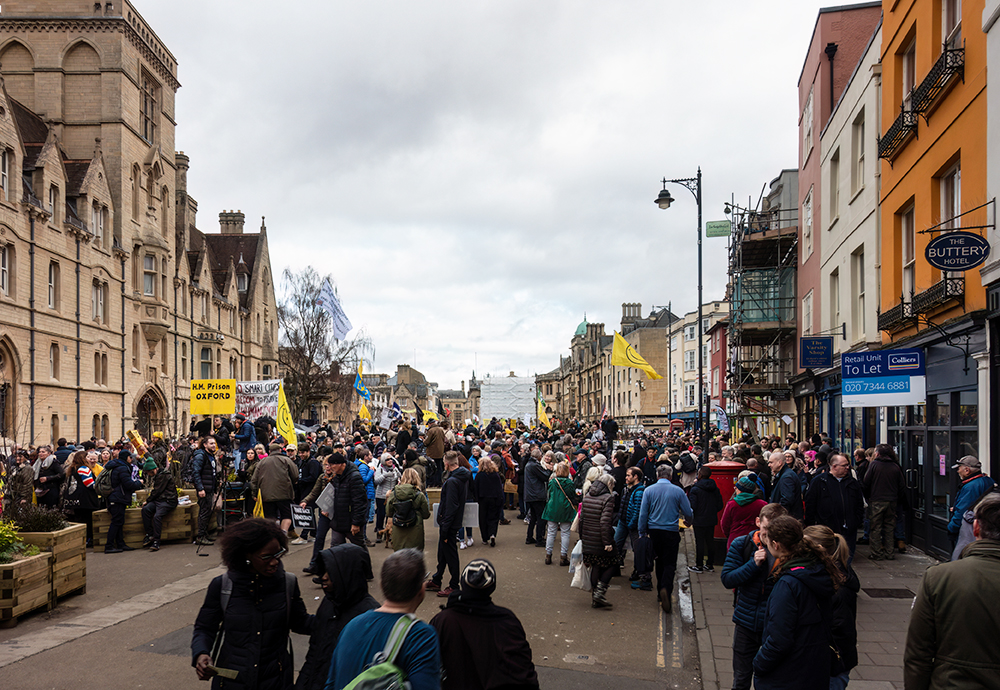In a new report, authors Martin Cassini and Richard Wellings of the UK Institute of Economic Affairs demonstrate what they say are the negative social and economic effects of the government’s traffic management strategy, and argue for policies that harness voluntary cooperation among road-users. Using case-studies from around Britain, in conjunction with evidence from successful schemes in both Holland and Germany, they estimate that approximately 80 per cent of traffic lights could be ripped out in the UK.
In a new report, authors Martin Cassini and Richard Wellings of the UK Institute of Economic Affairs demonstrate what they say are the negative social and economic effects of the government’s traffic management strategy, and argue for policies that harness voluntary cooperation among road-users. Using case-studies from around Britain, in conjunction with evidence from successful schemes in both Holland and Germany, they estimate that approximately 80 per cent of traffic lights could be ripped out in the UK.
The report says a huge proliferation in traffic regulations over the past twenty years has imposed a heavy burden on the economy. Just a two-minute delay to every car journey equates to a loss of approximately US$23 billion every year, equivalent to almost one per cent of GDP.
According to the IEA, the number of traffic lights in England has increased by 25 per cent since 2000. By comparison, vehicle traffic rose by five per cent and the length of the road network by just 1.3 per cent in the same period.
The report claims that traffic regulations, including speed humps, bus and cycle lanes and speed cameras are damaging to the economy and have a detrimental effect on road safety and the environment, whilst imposing huge costs on road-users and taxpayers across the UK.
Cassini and Wellings make a case for an alternative approach which they say deliver many of the desired objectives, such as road safety, without the costs. They say shared space removes conventional traffic infrastructure, such as traffic lights, road markings and bollards. The report says evidence demonstrates that when regulations are removed, including the rules that give some vehicles priority over others, drivers behave with more consideration to other road users, improving safety and allowing traffic to flow more smoothly.
Commenting on the report, Dr Richard Wellings, head of transport at the Institute of Economic Affairs, said: “For too long policymakers have failed to make a cost-benefit analysis of a range of regulations – including traffic lights, speed cameras and bus lanes – making life a misery from drivers nationwide. It’s quite clear that traffic management has spread far beyond the locations where it might be justified, to the detriment of the economy, environment and road safety.
“The evidence of shared space schemes shows the transformational benefits of less regulated approach, whilst the removal of a high proportion of traffic lights would deliver substantial economic and social benefits”
The report says a huge proliferation in traffic regulations over the past twenty years has imposed a heavy burden on the economy. Just a two-minute delay to every car journey equates to a loss of approximately US$23 billion every year, equivalent to almost one per cent of GDP.
According to the IEA, the number of traffic lights in England has increased by 25 per cent since 2000. By comparison, vehicle traffic rose by five per cent and the length of the road network by just 1.3 per cent in the same period.
The report claims that traffic regulations, including speed humps, bus and cycle lanes and speed cameras are damaging to the economy and have a detrimental effect on road safety and the environment, whilst imposing huge costs on road-users and taxpayers across the UK.
Cassini and Wellings make a case for an alternative approach which they say deliver many of the desired objectives, such as road safety, without the costs. They say shared space removes conventional traffic infrastructure, such as traffic lights, road markings and bollards. The report says evidence demonstrates that when regulations are removed, including the rules that give some vehicles priority over others, drivers behave with more consideration to other road users, improving safety and allowing traffic to flow more smoothly.
Commenting on the report, Dr Richard Wellings, head of transport at the Institute of Economic Affairs, said: “For too long policymakers have failed to make a cost-benefit analysis of a range of regulations – including traffic lights, speed cameras and bus lanes – making life a misery from drivers nationwide. It’s quite clear that traffic management has spread far beyond the locations where it might be justified, to the detriment of the economy, environment and road safety.
“The evidence of shared space schemes shows the transformational benefits of less regulated approach, whilst the removal of a high proportion of traffic lights would deliver substantial economic and social benefits”










